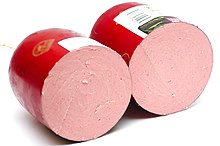kolbassi
Hello, you have come here looking for the meaning of the word kolbassi. In DICTIOUS you will not only get to know all the dictionary meanings for the word kolbassi, but we will also tell you about its etymology, its characteristics and you will know how to say kolbassi in singular and plural. Everything you need to know about the word kolbassi you have here. The definition of the word kolbassi will help you to be more precise and correct when speaking or writing your texts. Knowing the definition ofkolbassi, as well as those of other words, enriches your vocabulary and provides you with more and better linguistic resources.

Kolbassi.
English
Noun
kolbassi (countable and uncountable, plural kolbassi)
- Rare form of kielbasa.
Ingrian

Alternative forms
Etymology
Borrowed from Russian колбаса (kolbasa).
Pronunciation
- (Ala-Laukaa) IPA(key): /ˈkolbɑsːi/,
- (Soikkola) IPA(key): /ˈkolbɑsːi/,
- Rhymes: -olbɑsʲː, -olbɑsːi
- Hyphenation: kol‧bas‧si
Noun
kolbassi
- (thick) sausage
- 1937, N. A. Iljin, Lukukirja: Inkeroisia alkușkouluja vart (kolmas osa), Leningrad: Riikin Ucebno-pedagogiceskoi Izdateljstva, page 29:
- Koko päivääs hää söi kaks kertaa: perepletcikalt söi vähäin kleisteriä i yhest traktirast löysi kolbassin nahan, — vot i kaik.
- The entire day she ate two times: she ate a little starch glue from the bookbinder and from one of the inns she found a skin of a sausage — that's it.
Declension
| Declension of kolbassi (type 5/vahti, no gradation) | ||
|---|---|---|
| singular | plural | |
| nominative | kolbassi | kolbassit |
| genitive | kolbassin | kolbassiin, kolbassiloin |
| partitive | kolbassia | kolbassija, kolbassiloja |
| illative | kolbassii | kolbassii, kolbassiloihe |
| inessive | kolbassiis | kolbassiis, kolbassilois |
| elative | kolbassist | kolbassiist, kolbassiloist |
| allative | kolbassille | kolbassiille, kolbassiloille |
| adessive | kolbassiil | kolbassiil, kolbassiloil |
| ablative | kolbassilt | kolbassiilt, kolbassiloilt |
| translative | kolbassiks | kolbassiiks, kolbassiloiks |
| essive | kolbassinna, kolbassiin | kolbassiinna, kolbassiloinna, kolbassiin, kolbassiloin |
| exessive1) | kolbassint | kolbassiint, kolbassiloint |
| 1) obsolete *) the accusative corresponds with either the genitive (sg) or nominative (pl) **) the comitative is formed by adding the suffix -ka? or -kä? to the genitive. | ||
See also
- makkara (“(thin) sausage”)